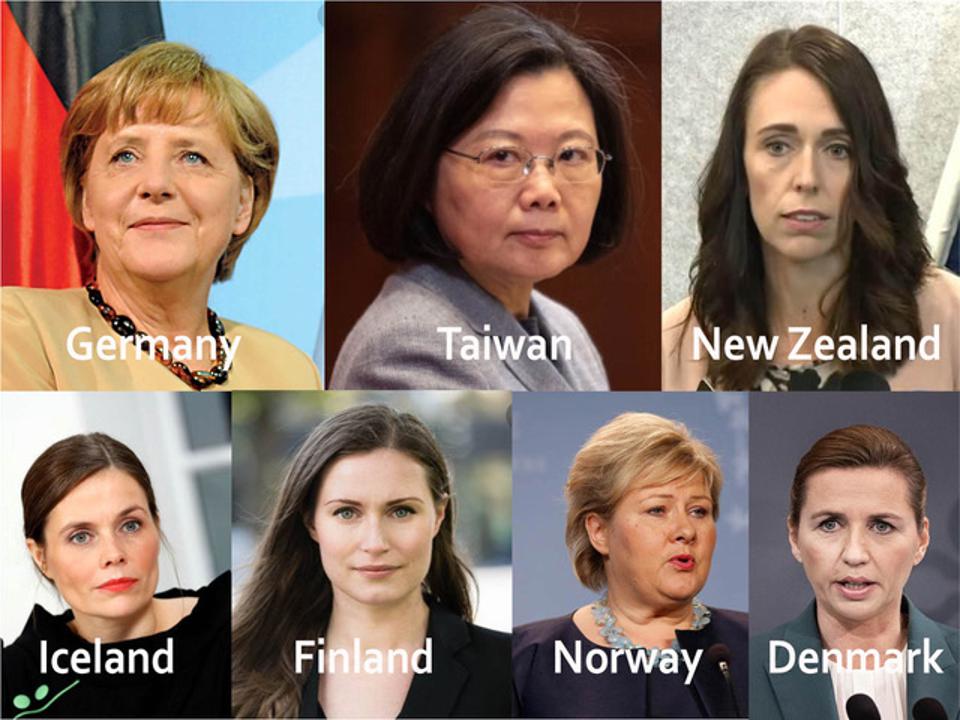Female-Led Countries Outsmart Their Counterparts: How They Did It and Their Legacy
- Ingrid Guo

- Jan 16, 2021
- 3 min read
Author: Eliana Eisman '22
As the novel coronavirus continues to rage across the globe, recently approved vaccines by Pfizer and Moderna bring hope that both lives and health will be spared. While personal approaches to protection such as social distancing, mask-wearing, and remote adaptations of work or school are crucial to the decline of COVID-19, the national response of a country’s government characterizes the course of the pandemic within their borders. Female leaders, supported by data, have been more successful in the navigation of the virus than their male counterparts.
Uma Kambhampati, professor of economics at Reading University in the UK, and Supriya Garikipati, an economics professor at the University of Liverpool, investigated this pattern to pinpoint what specific aspects had been best managed. Their findings revealed positive results in two major areas: quick lockdowns and lower fatality rates. Female leaders were found to have reacted in a more decisive fashion and initiated lockdowns earlier on. Garikipati noted, “while this may have longer-term economic implications, it certainly helped these countries to save lives,” which was the second studied result. An overall lower infection rate was reported, but “in the case of deaths, the significance was much more obvious,” Kambhampati reflects on her research team’s data. So, who exactly are the distinguished women of the study?
Angela Merkel, Chancellor of Germany since 2005, was an exemplary role model who’s population followed her lead. She addressed the virus in a frank manner declaring, “it’s serious...take it seriously.” Merkel never held back information nor emotions, which allowed the country to skip over a period of frivolousness and combat the virus “right from the get-go.” The Prime Minister of Norway, Erna Solberg, took effective action through relationships with the public as well. She organized a televised press conference to answer questions from the nation’s children, with no adults allowed, and validated any overwhelming emotions they might have felt. Solberg answered a range of questions covering how penalty shootouts in soccer might work, visitation of grandparents, if cats can contract the virus, and most heartwarmingly, “when can we give hugs again.” Author Avivah Wittenberg-Cox juxtaposes the empathetic angle of women like Solberg to their male peers and criticizes the men’s “terrifying [trifecta of] authoritarianism.” Lastly, Tsai Ing-wen of Taiwan instituted 124 measures to not only slow, but “block,” the spread of the virus long before the extent of its danger was known. Her decisiveness kept the country out of a lockdown and under 10 deaths within the first month of the pandemic. To put this feat into perspective, the United States death toll amounted to 23,000 at the time, and even when compared proportionally, had a rate almost eight times that of Taiwan.
As a young woman with dreams of leadership in the workplace and beyond, I look up to the influential women that have already defied historically instituted standards of male dominance. In a country that continues to struggle with gender inequity, established by our founding fathers’ intent on a male administration, the visibility of women in power is one of the only authentic reminders that my so-called “dream” is very much conceivable. Each day as new women take on leading roles in businesses of all sizes, activism, the government, or their own household, I feel the connection and passion behind our gender surge.
Vice-president-elect Kamala Harris will undoubtedly find herself included in future studies of female success, just like Kambhampti and Garikipati’s. Her contribution to the list of “firsts” for our gender in the United States government is extraordinary. Harris claims responsibility as the first female district attorney of San Francisco, the first female attorney general of California, and will soon be sworn in as the first female vice-president. I am absolutely ecstatic for Kamala Harris to take office, and you should be too. Regardless of political affiliation, Harris’ election embodies opportunity and change. She shattered the glass of a ceiling she refused to believe existed.
I hope to see Kamala Harris, and respected women alike, take leadership with the qualities that make them so distinct, because in the words of Wittenberg-Cox, “it’s time we recognized it —and elected more of it.”
Sources:
Image Sources:










Comments